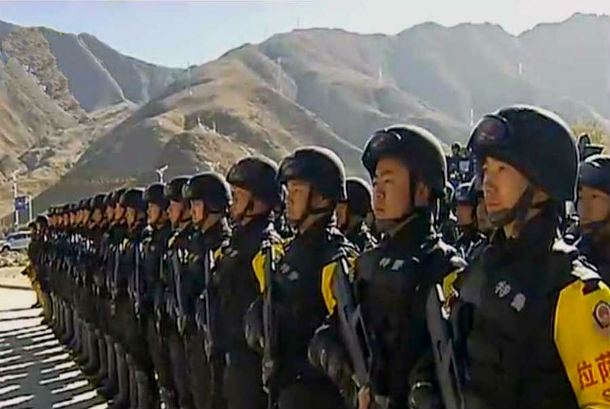 London — Tighter security regulations are being implemented in Tibet's border region to combat what state-run media refers to as, "growing incidents of separatist and terrorist activities."
London — Tighter security regulations are being implemented in Tibet's border region to combat what state-run media refers to as, "growing incidents of separatist and terrorist activities."
The report from The Global Times says that the border areas covered by the updated regulation include, "land ports, trade zones and scenic spots", and low-level government will be expected to provide support to the police in monitoring the border.
It is unclear exactly what kind of terrorist threat the authorities are anticipating or whether they expect it to come from within Tibet or from beyond its borders. Wang Chunhuan, a member of the Tibet Academy of Social Sciences (TASS) and a participant in the security amendment, was quoted in the report as saying that the border areas do not face severe terrorist threats at present. Instead he claims that tighter security lays the foundation for combatting potential terrorism activity in the future as Tibet becomes the, "gateway to South Asia".
Using the fear of terrorism to implement tougher security laws has become widespread around the world in the 21st century, with rights advocates claiming many security measures appear to be aimed at limiting people's rights rather than providing greater protection.
John Jones, communications director of the rights group Free Tibet told TPI that China does not face an outside terrorist threat on the Tibetan border, which he describes as one of the most mountainous and heavily policed regions in China. He said the government has used the pretext of terrorism in the past to justify crackdowns on demonstrations and dissent. "Under its vaguely-worded state security crimes, Tibetans have received harsh prison sentences for a range of 'crimes', from celebrating the Dalai Lama's birthday to flying Tibetan flags to blogging and carrying out peaceful demonstrations."
He continued: "China has had no recent wars with India, while Nepal has in recent years cooperated with its policy of restricting land borders with Tibet. From a Tibetan perspective, the border controls appear to be more geared towards preventing people from leaving Tibet rather than getting into Tibet, and also trying to pacify Tibet during what could be a very tense few months. Between now and April there are series of important events to Tibetans that China will be monitoring closely for signs of dissent or organised resistance to its rule.
"These include Losar (Tibetan new year) in February, Uprising Day (the anniversary of the 1959 Tibetan uprising against the Chinese invasion and occupation) in March, and Kalachakra, one of the most important events in Tibetan Buddhism, and which is currently taking place in Bodh Gaya in Bihar, India."
There have already been several reports indicating a security crackdown in Tibet due to the Kalachakra event, which begun on 2 January. Members of the organising committee recently told reporters in India that many people have been blocked from leaving China, while thousands of others have been forced to return home.


![Tibet has a rich history as a sovereign nation until the 1950s when it was invaded by China. [Photo: File]](/images/stories/Pics-2024/March/Tibet-Nation-1940s.jpg#joomlaImage://local-images/stories/Pics-2024/March/Tibet-Nation-1940s.jpg?width=1489&height=878)















